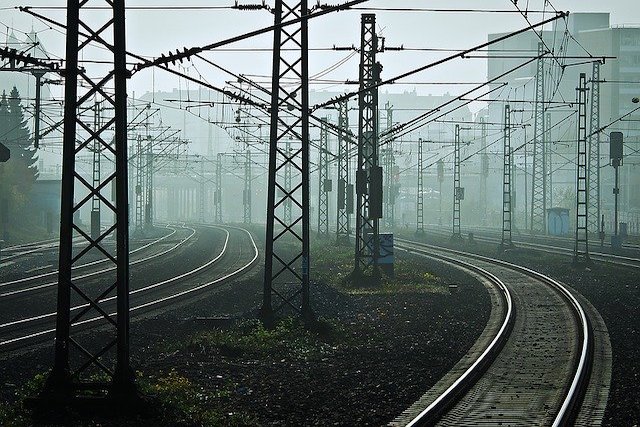The railway industry is an absolutely vital component of the UK’s transport network. It is also one of the most prestigious systems in the world, carrying thousands of people every single day.
Like all modes of transport, safety is paramount for the railway industry. This means that every single component, no matter how small and seemingly insignificant, has to be able to cope with the unique pressures and conditions they are subjected to.
But what types of CNC precision turned parts are used in the railway sector, and how do precision engineering companies support this vital network?
Benefits of CNC Precision Turned Parts

Before we look into the types of CNC precision turned parts used in the railway sector, we’ll first of all explore several key benefits that the precision engineering industry provides. To begin with, CNC machining allows engineers to create extremely large quantities of specialist parts accurately and quickly. The railway system is vast, meaning it needs a great number of components in a tight turnaround time.
The use of CNC turning and CNC milling means that these components can be created around the clock, with each one being exactly the same as the last. This saves clients a lot of time and money when compared to traditional manual machining. Using machinery also enables engineers to manufacture parts that have extremely complex geometry that human engineers would struggle to duplicate themselves.
CNC Precision Turned Parts Used in the Railway Industry

Now that we’ve explored how the railway sector is supported by CNC machining, it’s time to look at several CNC precision turned parts and materials that are made for the industry.
Wheels and Bogies
A bogie is the four or six-wheel trucks that support all railway vehicles. The design of these bogies has progressed dramatically over the years, moving from a simple construction to an intricate assembly of complicated CNC turned parts. This is especially the case with high-speed tilting rolling stock.
Using CNC machining ensures that any heat transference is significantly reduced, vastly decreasing the risk of metal deformation. As mentioned before, this is absolutely vital to ensure safety. Design tolerances are also extremely tight, something that only CNC precision turned parts can cope with.
Other CNC precision turned parts that make up the bogie units include components such as caliper pins, brushes and specialist bolts. Precision engineering is also used to create the springs and fixings in the suspension system.
The types of rolling stock that typically need bogies and wheels include trailers, underground carriages, trams, locomotive wagons and high-speed trains.
Engine & Gearbox Components
A large number of CNC precision turned parts are used to make up the complex engines and gearboxes in railway trains. The types of components created include ground gears, helical gears, flywheels and layshafts.
CNC machining techniques are also employed when manufacturing gear shafts, spline shafts, timing pulleys and sprockets. Worms and worm wheels are other components that can be manufactured by precision engineers.
All of the gears and components listed above can also be created to be used in things such as bogies, axle bones, braking systems and running gears.
Pinion Sets and Gear Racks
Gear racks and pinion sets are used in a wide range of applications in the railway industry. These include mechanisms for train and platform doors, lifts and lifting equipment, switchgear units and valves.
CNC precision turned parts are also used in the manufacturing of accessibility equipment, tipper mechanisms, sitting mechanisms and portable drilling machines.
The smooth running of mechanisms that require rack and pinion drives is absolutely important. This is something that CNC machining can effortlessly achieve, which is just another reason why the sector is extremely important to the railway industry.
Small Components
The railway network as a whole comprises thousands and thousands of small and intricate CNC precision turned parts. Each of these components are specialist in design and have extremely complex geometries.
Examples of small CNC precision turned parts that are manufactured include rail fixings, point mechanisms and relays for signalling systems.
Composite Materials
While these are not CNC precision turned parts, precision engineering techniques are also used in the creation of a variety of materials including plastics, composites and synthetic resins. Modern-day train carriages use composite materials created via CNC machining for their bodies and for internal fixtures.
Other materials that are used in the creation of CNC precision turned parts for rail and train components include aluminium, mild steel, brass, cast iron and stainless steel.
Why Choose EGL Vaughan

Because the railway industry is such an important transport network, it is extremely important that all of the CNC precision turned parts that are created are durable and able to stand the test of time. There is absolutely no room for error, meaning that clients have to be completely confident in the abilities of their manufacturers.
EGL Vaughan has lived and breathed the railway industry for over 40 years. During this time, we have developed an in-depth understanding of the sector and its unique requirements. This leaves us perfectly placed to assist you with your projects, no matter the size and scale. We were founded on the ethos of “if you need it, we can make it”, meaning we are 100% confident in our ability to help.
Throughout our history, we have cultivated a strong reputation for both the quality of our work and our customer service. We are extremely proud of our numerous accreditations, including some from the most prestigious organisations in the industry. In addition, we have developed a robust quality control procedure that ensures absolutely everything we create conforms to the even the tightest of specifications – first time, every time.
We are committed to providing our clients with the best possible service. We will work with you to determine your exact requirements and provide you with a rapid quote. In addition, we ensure that we are always available to offer expert advice and support throughout the entire manufacturing process. It is this level of service that makes our clients return to us time and again.
For more information about how we can help you with CNC precision turned parts, contact our team today.


